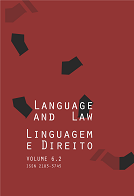The reliability of voice recognition by ‘ear witnesses’: An overview of research findings
Abstract
n ear witness is an individual lacking training in relevant branches of phonetic science, who hears a voice related to a crime, and claims to be able to identify the speaker. As with eye witness evidence, condent ear witness testimony is known to be highly compelling to triers of fact. But how reliable is it? This paper provides an overview of research ndings, focusing mainly but not exclusively on situations where the witness hears an unfamiliar voice, then recognises someone heard at a later date as having been the speaker. The overview starts by outlining research demonstrating the unreliability of eye witness evidence, and the measures now commonly used in trials to counter its acknowledged weaknesses. It then reviews evidence from long-standing research across several disciplines indicating that ear witness evidence is considerably less reliable than eye witness evidence, and that its weaknesses are harder to cure.
Downloads
Published
How to Cite
Issue
Section
License
Copyright (c) 2020 Language and Law=Linguagem e Direito

This work is licensed under a Creative Commons Attribution-NonCommercial 4.0 International License.
Este trabalho está licenciado com uma Licença Creative Commons - Atribuição-NãoComercial 4.0 Internacional.






